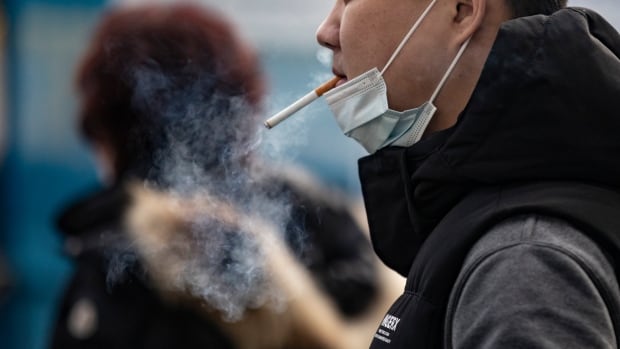
At first, Cory Holland thought government anti-smoking measures were working when he noticed tobacco sales at his British Columbia convenience store started to drop.
Holland said he recalled thinking that perhaps tax increases and the shift to plain packaging to deter young people from buying cigarettes actually convinced more people to quit smoking.
But losing half of sales over three years and observing the smoking habits of his own employees at his Kelowna-area store told him a darker story about organized crime and the growth of contraband tobacco in B.C., said Holland in an interview.
Retail organizations, merchants and tobacco industry officials estimate between 30 and 50 per cent of tobacco sales in the province are contraband products, and they are calling on governments and police to crack down on the organized crime groups that sell them.
“Unbeknownst to me, this illegal market of contraband tobacco was growing rapidly,” said Holland. “Our sales are down 50 per cent compared to three years ago. Last year, half of my staff were smoking [contraband cigarettes].”
Holland, whose Oyama General Store includes groceries and convenience items, a post office and liquor outlet, said the prevalence of contraband tobacco impacts his bottom line but it also hurts taxpayers and the health care system.
A pack of cigarettes at his store sells for between $17 and $21 and cartons of cigarette packs cost about $175, while contraband cigarettes sell for about $5 a pack and the cartons for about $50, said Holland.
“I’m down $200,000 in sales from three years ago,” he said. “I’m just a little store in B.C. You can imagine the lost tax dollars. There’s no money going back into the health care system. Worse than that, people are smoking those cigarettes and nobody’s inspecting them.”
‘Major’ problem for B.C.
The Convenience Retailers Alliance 4 Safe Communities says in a statement its most recent data and studies indicate “illegal tobacco makes up more than 30 per cent of our province’s tobacco market, putting B.C. as one of the worst provinces when it comes to contraband in Canada.”
The organization called on B.C. Premier David Eby to ensure the government includes measures to combat illegal tobacco as part of its public safety agenda.
“Contraband tobacco invites criminal activity into our communities, puts contraband tobacco into the hands of children and youth, and hurts convenience store operators who follow the rules but are forced to compete with the black market,” an alliance statement issued in November said.
The B.C. government says the Tobacco Tax Act includes stiff penalties for dealing in illegal tobacco.
The Ministry of Finance said in a statement that B.C. strictly regulates the sale, purchase, possession and transportation of tobacco and the province has taken steps to combat the sale and use of contraband products.
“That work includes a designated inspections program that helps prevent the sale of contraband products in retail outlets,” the statement said. “We also participate in the federal and provincial tobacco stamping program that offers improved security features and markings. This makes counterfeit tobacco products more difficult to produce and easier to identify.”
It says the finance ministry has a dedicated investigations unit that works closely with municipal police forces, the RCMP, Canada Revenue Agency, Canada Border Services Agency and other law enforcement agencies.
The ministry says B.C. generated $708 million in tobacco tax revenue in 2021-2022 and $711 million the year before that.
A spokesperson for one of Canada’s largest tobacco companies said it warned the B.C. government about growing crime involvement in the tobacco market but the response has been limited.
“It’s a major problem, but nobody is going to cry because big tobacco is losing money. But governments across Canada are losing approximately $2 billion a year on this,” said Eric Gagnon, Imperial Tobacco Canada vice-president external affairs, in an interview.
“In B.C., we valuate the illicit [market] is around 35 per cent, approximately,” he said. “There’s multiple evidence illegal traffickers are taking over.”
Gagnon said contraband tobacco is produced at clandestine manufacturing sites in Canada and the products are distributed across the country, with B.C. and Alberta being prime markets.
“It’s impossible to compete with price,” he said, adding a carton of illegal cigarettes sells for about a quarter of the price of the taxed carton.
Gagnon said the tobacco industry is prepared to work with the government, retailers and health groups in the fight against contraband tobacco.
“Obviously, it’s a big problem for us as a company,” he said.
No one from the RCMP was available for an interview, but Sgt. Chris Manseau with E Division headquarters in B.C. said anyone in the industry who has concerns should report to their local police immediately.
Holland, who says contraband tobacco is sold at sites away from retail outlets like his, said he estimates the illegal sales could comprise up the 50 per cent of the entire market in B.C.
“I want to say they’ve got half the market,” he said. “It’s a problem. It’s not just a personal concern of ‘Hey, I’m out money in my pocket.’ I worry something like this is going to have a major effect on the health care system.”